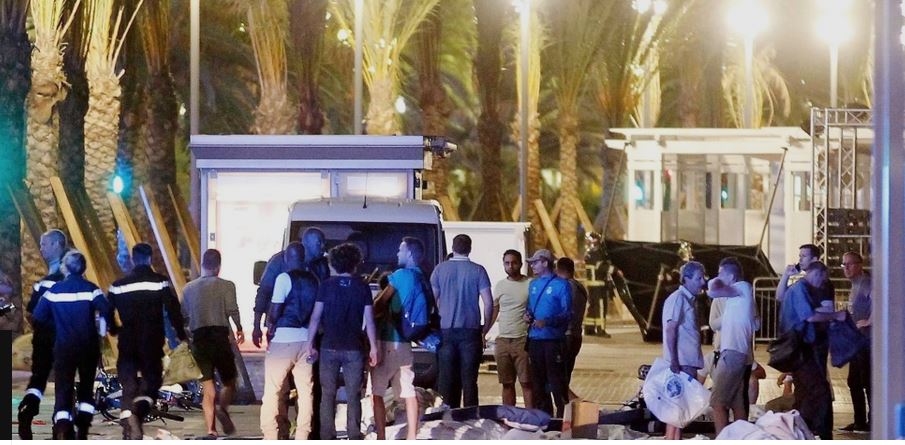After Nice, Don’t Give ISIS What It’s Asking For
by Murtaza Hussein, The Intercept, July 15, 2016.
Not much is yet known about Mohamed Lahouaiej Bouhlel, the
31-year-old man French police say is responsible for a horrific act of
mass murder last night in the southern city of Nice. In the wake of
the killings, French President Francois Hollande has denounced the
attack as “Islamist terrorism” linked to the militant group the Islamic
State. Supporters of ISIS online have echoed these statements, claiming
responsibility for the attack as another blow against its enemies in
Western Europe.

While the motive for the attack is still under investigation, it is
worth examining why the Islamic State is so eager to claim such
incidents as its own. On the surface, ramming a truck into a crowd of
people gathered to watch Bastille Day fireworks seems like an act of
pure nihilism. No military target was hit. Initial reports suggest that
the killings may lead to French attacks on ISIS’s already-diminishing
territories in Iraq and Syria. And French Muslims, many of whom were reportedly killed
in the attack, will likely face security crackdowns and
popular backlash from a public angry and fearful in the wake of another
incomprehensible act of mass murder.
But the Islamic State’s statements and history show that such
an outcome is exactly what it seeks. In the February 2015 issue of its
online magazine Dabiq, the group called
for acts of violence in the West that would “[eliminate] the grayzone”
by sowing division and creating an insoluble conflict in Western
societies between Muslims and non-Muslims. Such a conflict would force
Muslims living in the West to “either apostatize … or [migrate] to the
Islamic State, and thereby escape persecution from the crusader
governments and citizens.”
This strategy of using violence to force divisions in society mimics the group’s tactics in Iraq, where it used provocative attacks against the Shiite population to deliberately trigger a sectarian conflict, one that continues to rage to this day.
It may be that the Islamic State had no direct line of
communication to Bouhlel. Unlike many other previous attackers, he had
not been on the radar of French security services. There is no
indication that he had received training or traveled to ISIS territory.
Initial reports from those who knew him paint a picture of a depressed
and angry man who
“spent a lot of his time at a bar down the street where he gambled and
drank.” He had a history of petty crime, including an arrest this past
May following a road-rage incident.
But in a way, these details don’t matter. ISIS’s model for terrorism
relies on the weaponization of individuals such as Bouhlel; the group
calls on the young, angry, and purposeless around the world to lash out
at those around them in its name. In this way, the power of desperate
insurgents is magnified through a combination of social media and propaganda of the deed. An influential text used by the group, titled The Management of Savagery,
prescribes terrorist attacks as a means of “inflam[ing] opposition,” to
drag ordinary people into conflict whether “willing or unwilling, such
that each individual will go to the side which he supports.”
In the West, deadly
attacks in Paris, Brussels, Orlando, and elsewhere are bringing the
Islamic State’s goal of a divided world closer to fruition.
Far-right
parties hostile to minorities are growing in popularity in Europe,
while in the United States, polls show significant public support
for once-unthinkable measures like banning non-citizen Muslims from the
country. Like a hurricane in slow motion, every act of violence seems
to do incremental damage to the possibility of a tolerant, liberal
society.
After yesterday’s attack in Nice, former Republican House Speaker
Newt Gingrich piled on by calling for “[testing] every person here who
is of a Muslim background” and adding, “If they believe in Sharia, they
should be deported.” It was a somewhat ironic statement for Gingrich,
who in years past helped arrange space for Muslim staffers to pray on
Capitol Hill and took part in planning sessions for the Islamic Free
Market Institute, a free-market advocacy group that supports Sharia-finance products.
Gingrich’s outburst, however impracticable, does reflect
hardening public sentiments. As time goes on and attacks by lone wolves
and others in the name of ISIS continue, it’s not unfathomable that
proposals such as his could gain traction.
But from both a strategic and moral perspective, the worst thing that
could be done in response to the horror of incidents like Nice would be
to give ISIS what it says it wants: polarization and communal hatred.
Proposals for ethnic cleansing or “civilizational war” may satisfy a
desire to project toughness, but in reality, they feed into the group’s
narrative of a world irrevocably divided along religious lines.
Western Europe has faced down greater waves of terrorism
in the past without giving into the strategy of the terrorists or
sacrificing its intrinsic values. The crisis of the Islamic State will
require a similar degree of steadfastness. But only by recognizing the
trap it has set can we avoid inflicting a defeat on ourselves far worse
than a desperate, fanatical insurgent group could ever hope to achieve
on its own.


